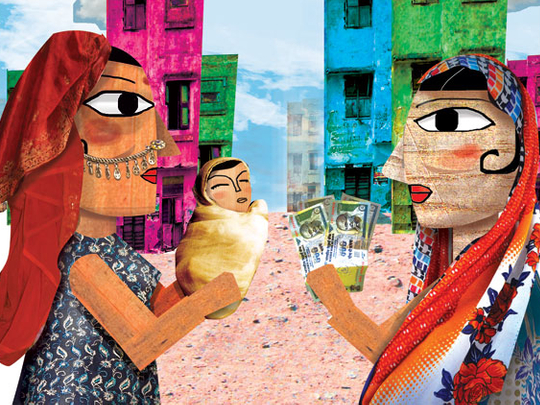
New Delhi: A large-scale baby-selling racket thrives across several states of India — young children are sold like commodities for anything between Rs1,000 (Dh66) to Rs500,000 to affluent childless couples deprived of joys of natural parenthood or to those wanting to avoid the hassles of the long-winded legal adoption process.
“In effect, baby-selling is the practice of selling children, usually by parents, close persons, or subsequent masters or custodians. Pay the cash and take the baby home. It is as simple as that and as instant as that.
By doing this, one can bypass the interminable waits and the extensive documentation required to establish credentials and financial status of the parents.
All one need do is produce an identity proof and the alleged racketeers hand over the child along with the birth certificate with your name on it,” Telangana Rashtra Samithi (TRS) Member of Parliament (MP) and film actress Vijayashanti told Gulf News.
The babies are procured from marginalised couples, who willingly or perforce, sell their offspring for a few hundred or thousand rupees. At times, the promise of regular meals is enough to induce the women into making reproduction their business.
According to a recent news website expose, the doctors and nurses in some government hospitals of Uttar Pradesh are openly selling newborn babies from poor families for approximately Rs40,000. They claimed that there was a high demand for baby boys in particular.
Taking cognisance of it, the National Commission for Protection of Child Rights (NCPCR) wrote to the Chief Secretary of Uttar Pradesh demanding action on the Amroha baby sale case.
NCPCR asked the state government to get the alleged racket, not only in the town of Amroha but also in the hospitals throughout the state, thoroughly investigated.
The Commission further asked the Uttar Pradesh government to intimate it about the safeguards put in place by the Director General of Health Services or the Hospital Administration of the state government and the District Administration in the nursing homes and hospitals against the sale or illegal adoption of the babies.
Meanwhile, Uttar Pradesh Chief Minister Akhilesh Yadav said that he will look into the sale of babies.
“If anything of the sort is found, we will ask the district administration to help the families. I promise to ask the district administration to help in the investigations and contact the concerned families,” he said.
Similarly, the Child Welfare Committee (CWC) in Mumbai suspects the rampant sale of newborn babies in private and government clinics.
In a recent letter to the state government, it notes that the number of children abandoned by their parents has been shrinking.
It is mandatory for hospitals to report the number of such babies to the CWC. In response, the Directorate of Health Services has written to all clinics and hospitals under its jurisdiction to look into the matter seriously.
Recently, the police started an inquiry in the case of a poverty-stricken woman in Bihar’s Araria district selling her four-month-old son for just Rs62 to a Nepalese couple.
“I was informed that a poor woman sold her child to a Nepalese couple. We have now begun investigation into it,” Araria police chief Shivdeep W. Lande told Gulf News.
Shannu Khatun sold her son to a Nepalese couple at Forbesganj railway station, near the Indo-Nepal border in Araria, about 350 km from Patna.
Khatun, along with her children, had left her village a few days ago and taken shelter at the Forbesganj railway station.
She refuted the allegation that she had sold her child but admitted to giving the baby away for his own sake.
But her eight-year-old elder daughter Sabina told some local residents that her mother sold her younger brother for a mere Nepalese Rs100 (Indian Rs62).












